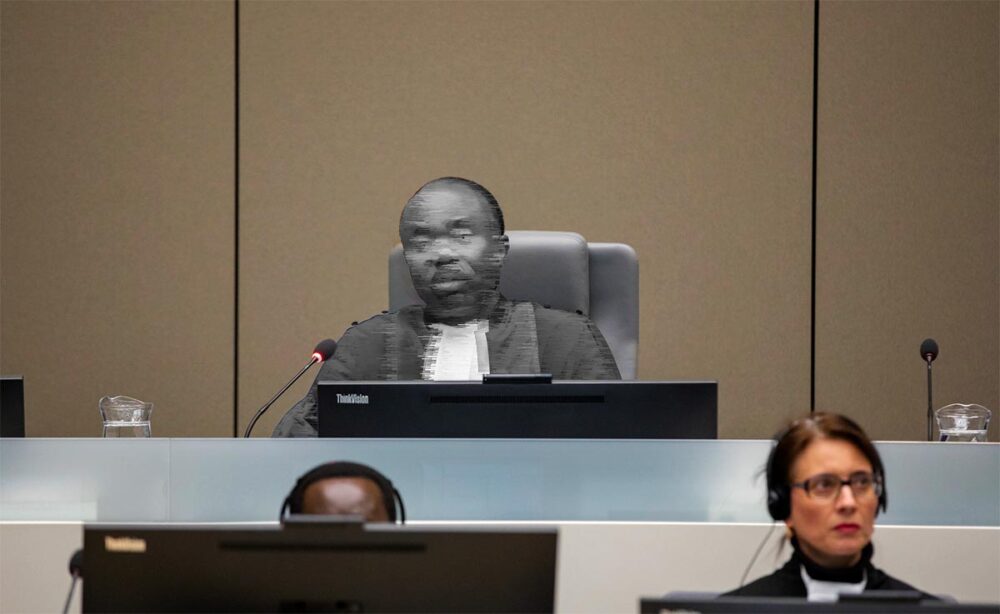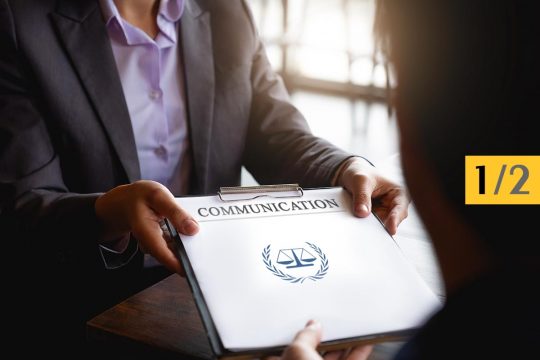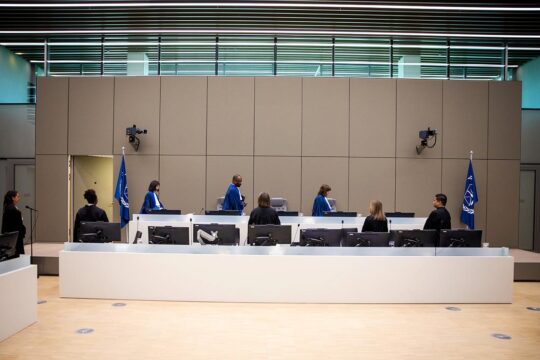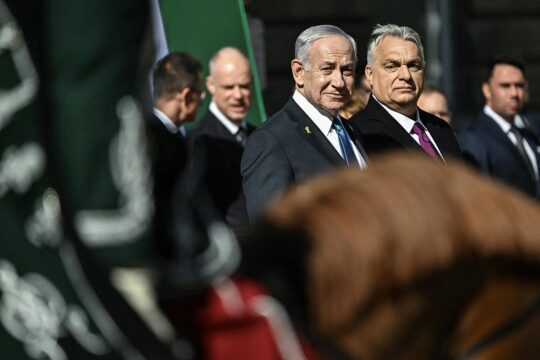For the past few months, much of the world’s attention has been focused on the disappearance of a single person from public life, with masses of speculation about the consequences of a missing princess for the functioning of an august institution - the British royal family. On a much smaller scale, the narrow coterie of international justice watchers has noted the disappearance of Hague-based judge Antoine Kesia-Mbe Mindua, and is similarly concerned about its consequences for the long awaited verdict for one Malian man and for the smooth administration of justice of another august institution - the International Criminal Court (ICC).
The trial of Al Hassan Ag Abdoul Aziz Ag Mohamed Ag Mahmoud began over three years ago. He is charged with war crimes and crimes against humanity, including sexual slavery, for his role in Timbuktu northern Mali as leader of the religious police in the Ansar Dine Islamist group which took control of the city in 2012. His defence team, lead by Melinda Taylor, has argued that torture and duress against their client while he was detained in a Malian prison undermines the prosecution case. Both sides wrapped up their arguments after three years in court – and seven years for Al Hassan in detention. 52 witnesses were called by prosecution, two witnesses by the victims’ representative and 22 by the defence.
“A wait and see approach”
Those final arguments were before a three-person panel, as stipulated in the governing text of the ICC, presided over by judge Mindua. Eight months later, at short notice, the court abruptly cancelled the original date for the pronouncement of the judgement - 18 January - “In light of the current health situation” of Mindua, “who is temporarily unavailable”.
That temporary has continued. So that now ten months on from the final hearings - which in the judges’ handbook, is the expected limit of the length of time to deliver a judgement - there has been little information. It has only emerged in dribs and drabs, via obscure filings. In their latest request for the information, the defence has resorted to quoting from French media which published reports that the judge may have been ill for some months, and that he hoped to deliver a judgement in June. “A wait-and-see approach is not sustainable at this juncture”, the defence says.
“Judge Mindua remains generally unavailable”
The defence have made it clear that they have been provided with no direct information by the court. At the same time as victims’ counsel, they had enquired how to gain such information and had been told on February 5, by email, to make a formal request. It was responded to by single judge Kimberly Prost: “The parties and participants raise valid concerns and queries. The single judge can only agree that it is of the utmost importance, in the circumstances, and particularly at this stage, for all to receive updated information promptly. Best efforts have been made to obtain such information with as much detail as possible. However, judge Mindua remains generally unavailable such that the other judges of the Chamber have had only limited communication with him over the past four weeks.”
The list of questions raised by the unexplained and indeterminate absence of a judge is myriad. In a trenchant and prescient article from 2015, the now-deceased Megan Fairlie of Florida International University noted that “delayed verdicts tend to undermine public confidence in the relevant system of justice”. She was writing about the disqualification of a judge and immediate substitution of another at the then International Criminal Tribunal for the former Yugoslavia (ICTY) in the case against Serb politician Vojislav Seselj. But she used her critique of the lack of forethought in that tribunal, to predict that “unless changes are made, it is only a matter of time before an ICC Trial Chamber is rendered incomplete mid-trial”. “It’s only a matter of time, especially with these long trials” concurs Hemi Mistry of the University of Nottingham. “I’m surprised that this sort of issue hasn’t happened sooner,” she adds.
Al Hassan liable for compensation?
But how serious is the human impact? Despite this being “unusual” because it comes just before a trial judgement, says Mistry, it’s important to consider the real impact. “Undoubtedly,” she suggests “delays of this kind do impact upon a defendant. It would cause distress”. Al Hassan could even be liable for some compensation she suggests. Danya Chaikel, the FIDH representative to the International Criminal Court, describes the delay as “mysterious” and says that it “can extend victims’ trauma and uncertainty, affecting their mental health and well-being. The delay also directly impedes the implementation of reparations in the event of a conviction, stalling the healing process for victims and their communities”.
But separate from the uncertainty, is a delay prejudicial to Al Hassan’s rights to a fair trial? There Mistry is much more hesitant - so far. The evidence has all been presented. Three judges completed that task. That assessment could change. “If it wasn’t just a case of doing a final proofread of the judgement, and there is still a substantive decision making still to take place that does raise questions,” she says. “It’s not yet a violation of the right to fair trial,” agrees David Donat Cattin, adjunct professor at New York University. Even though, he says “certainty and predictability of proceedings is some sort of corollary to the principle of fairness in proceedings and the fact that every party needs to know exactly what will happen next and when and how.” But because this issue comes at the very end, “unfortunately, a real assessment of the importance of what’s going on can only be made ex post facto.”
An outgoing judge clinging to his post?
Judge Mindua’s absence comes against the backdrop of the changing of the guard among the judges at the ICC. Six new judges were elected in December at the Assembly of States Parties and Mindua is one of those leaving the court after 9 years of service. Established practice is that an outgoing judge finishes his trial work before departing.
At the same time, the incoming presidency of judges Tomoko Akane, president of the Court, Rosario Salvatore Aitala and Reine Alapini-Gansou, vice-presidents, has introduced - for the first time at the ICC - alternate judges for three trial chambers, but not for the Al Hassan Chamber. Donat Cattin recalls the experience of the biggest trial at the ICTY of former Serbian president Slobodan Milosevic, where the presiding judge fell sick and suddenly passed away. That “considerably delayed the trial, which was the most important one at the time,” and in the end it was never completed because of the death of the defendant. Fairlie was arguing 10 years ago that “alternate judges in international criminal proceedings - despite their price tag - are worth their weight in gold.”
In the case of the ICC Donat Cattin points out that those drafting the Rome Statute in 1998 were prescient. In paragraph one article 74 “it’s quite stunning,” he says, “to see that in the composition of the chamber, the presidency can assign an alternate judge under the statute.” Its “not the rules, not the regulations, not the practice manual,” it’s in the Rome Statute itself, he emphasizes.
“The alternative judge is imperative”
Then the question is why this provision was never applied, asks Donat Cattin: “I would ask the question to all the former presidents of the court”. While in the meantime, the Hague court is facing a considerable crunch in its lack of arrestees. None has entered the pipeline for a number of years. Instead, the judges have accepted the prosecutor’s proposal to organize an in absentia pre-trial hearing for Lords Resistance Army leader Joseph Kony. And several arrest warrants issued in the Ukraine situation have been made public, although unlikely to lead to arrests.
“I think it’s a matter of good lawmaking. The more complex a case, the more justified the presence of a fourth judge,” stresses Donat Cattin. “Because you don’t want to lose, at any moment in time, all the work done, the evidence, the witnesses, the documents acquired. If and when we will have big trials like Omar al-Bashir’s or one day, hopefully, Vladimir Putin’s, I would say that the alternative judge is imperative.”
The defence motions requesting information are angled at trying to understand who knew what when, and whether judge Mindua has kept his fellow judges, including the presidency, informed. However, if he has not been keeping his fellow judges informed, the question is raised about whether the presidency should be intervening.








